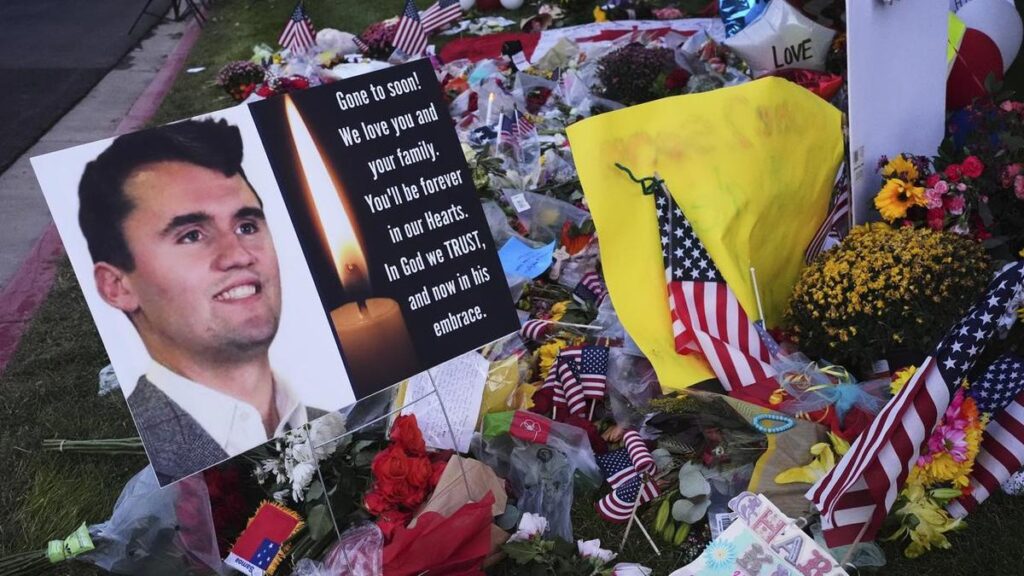
The recent fatal shooting of right-wing influencer Charlie Kirk has sparked a significant response from Republican leaders in the United States. They have urged Americans to mourn Kirk appropriately, warning of potential consequences for those who do not. The 31-year-old activist, known for his staunch conservative views and combative debating style, was widely condemned by Democratic and Republican leaders alike in the wake of his death.
As discussions surrounding Kirk’s murder unfold, a polarized reaction has emerged. While many express condolences, a range of voices—including some ordinary individuals and political figures—have jokingly or openly celebrated his demise. This backlash has led to organized campaigns targeting those perceived as disrespecting Kirk’s legacy. According to a tally by Reuters, at least 13 individuals have been fired or suspended from their jobs for making comments about the incident online.
Republicans are amplifying their response to this perceived disrespect, with some proposing extreme measures against Kirk’s critics. Suggestions include deportation, lawsuits, and lifetime bans from social media. Prominent figures such as conspiracy theorist Laura Loomer have taken to social media to rally support for these initiatives. Loomer warned individuals against celebrating Kirk’s death, stating, “Prepare to have your whole future professional aspirations ruined if you are sick enough to celebrate his death.”
Similarly, Louisiana Congressman Clay Higgins posted on social media, asserting that those who publicly expressed hatred towards Kirk should be “banned from ALL PLATFORMS FOREVER.” US Deputy Secretary of State Christopher Landau also expressed his disgust at individuals praising Kirk’s murder, directing consular officials to take appropriate actions against such behavior.
The Republican outrage contrasts starkly with the mockery that some of these figures, including Kirk himself, have directed at past victims of political violence. For instance, Higgins had previously mocked the assault on former House Speaker Nancy Pelosi’s husband, Paul, after he was attacked at their home in San Francisco. Kirk himself once called for the release of the intruder who attacked Paul Pelosi, suggesting that “some amazing patriot” should bail the assailant out.
The campaign against Kirk’s critics continues to gain momentum. A newly registered website, Expose Charlie’s Murderers, claims to list individuals who have supported political violence online. As of now, the site has 41 names and a backlog of over 20,000 submissions. A review of the comments on the site shows that while many individuals joked about or celebrated Kirk’s death, others simply criticized his far-right positions or pointed out the irony of a gun control opponent being shot.
One individual featured on the website described how their employer faced numerous calls demanding their termination. Speaking to Reuters on the condition of anonymity, they stated, “To be very, very clear, I don’t condone the murder of Charlie Kirk. But I do, at the same time, have to appreciate the irony of this situation.” They referenced Kirk’s past comments regarding gun deaths being “worth it” in light of the Second Amendment.
The origins and management of the website remain unclear, with no response to inquiries about its ownership or methodology. Squarespace, the site’s host, has also not commented on the situation.
In light of these events, Jay Childers, an associate professor of communications at Kansas University, noted the long-standing tradition of political elites attempting to control rhetoric and suppress dissent. He remarked, “I do not think this moment is really new in that sense,” while acknowledging that the internet allows for a wider range of voices to be targeted for their opinions.
As the aftermath of Kirk’s death unfolds, the implications of this response from Republican leaders may have lasting effects on political discourse in the United States. The tension between mourning a controversial figure and critiquing their legacy continues to polarize public opinion, highlighting the broader societal divisions that persist in contemporary politics.






